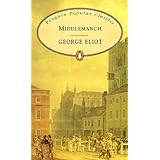Middlemarch began as two separate books, the story of Dorothea Brooke in one and the young doctor Lydgate in the other. However, it was only when Eliot combined the two, that the project that became Middlemarch really took off.
I began Middlemarch with some trepidation. This was the book, arguably the greatest novel in the English language. This was the one I couldn't possibly not read and still say that I was a true student of English literature. And yes, the combination of January blues, a new job and an overload of literary criticism did nearly finish me off. But now the dust has settled, I can comfortably say 'hat's off' to George Eliot.
When I began the book, I fully expected Dorothea to hold my centre stage. 'Yes, yes', I thought, 'that's all well and good, but what about Dorothea?' But as the characters developed and the 'web' of Middlemarch society became clear, it was Lydgate who captured my imagination. For me, the story of Lydgate does everything a novel should. He arrives in Middlemarch, young and idealistic. Here's a man who's going places, someone who's going to make a difference not just in this country town, but also the world of medicine. But, as the narrator reminds us, we all have our flaws and society acts upon us too. Lydgate has an eye for a pretty woman and the finer things in life. After an ill advised marriage he becomes embroiled in a local scandal and never lives up to his great expectations. Eliot draws the characters well and weaves a web around them. She reminds us of the ways in which an individual's actions create ripples in our communities and ultimately touch us all.

No comments:
Post a Comment